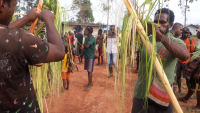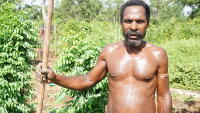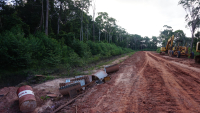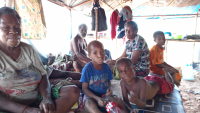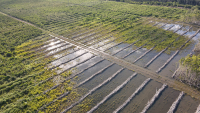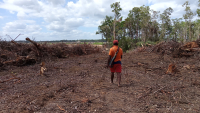Project – On record
This profile is no longer actively maintained, with the information now possibly out of dateEnvironmental Paper Network
Sergio Baffoni, +49 162 3812528; Environmental Paper Network (EPN)

Project – On record
This profile is no longer actively maintained, with the information now possibly out of dateEnvironmental Paper Network
Sergio Baffoni, +49 162 3812528; Environmental Paper Network (EPN)
Why this profile?
This plantation is located in a key biodiversity hotspot, where forests, swamps and savannas merge in a unique and fragile ecosystem. The area is home to 40 mammals, 30 reptiles and 130 fishes featured on the IUCN Red List of Threatened Species. These forests are also traditionally owned by indigenous clans, and provide them livelihoods (food, fibres, medicines), while the sacred groves are essential for their spiritual life. This area is being devastated to produce wood chips for papermaking, which must be halted immediately.
What must happen
Financiers of Moorim must ensure that PT PNMP publicly commits to a moratorium on further clearing, pending a serious analysis of the environmental and social impacts of its activities, and of protective measures that must be put in place. The company must also commit to restoring the area that it has already deforested. Indigenous clans’ rights must be respected, and any use of the traditional land must be subject to their Free, Prior and Informed Consent (FPIC). Existing damage must be fairly remedied.
For more information see Environmental Paper Network, March 2022, p. 44 "Demands to Moorim Paper".
| Sectors | Pulp, Paper and Paperboard Mills |
| Location |
|
| Status |
Planning
Design
Agreement
Construction
Operation
Closure
Decommission
|
| Website | https://www.moorim.co.kr:13002/eng/companyinfo/pnp_outline.php |
PT Plasma Nutfah Marind Papua (PT PNMP) operates a tree plantation near the village of Buepe, in Okaba and Kaptel, Merauke regency, Papua Province, Indonesia. At the plantation, the company clears natural vegetation and plants Acacia mangium and Eucalyptus pelita to produce wood-fibre for pulp and paper products. The plantation concession stretches over 64,050 hectares and includes natural forests, some primary forests, seasonal alluvial wetlands and other biomes. PT PNMP is owned by Moorim P&P (99.74%) and Moorim Paper (0.26%).
Impact on human rights and communities
The information provided in this profile is based on the Environmental Paper Network report "Trashing the Last Rainforest: How Papua Treasures are being Dumped into the Wastepaper Bin”, March 2022.
Loss of livelihoods and sacred sites The pulpwood concession held by PT Plasma Nutfah Marind Papua (PT PNMP) is located on land traditionally inhabited and owned by the Malind Indigenous People (Malind-anim), yet PT PNMP has repeatedly failed to respect the principle of Free, Prior and Informed Consent. Land-grabbing and deforestation take away not only local peoples’ livelihoods, they also strip them of their social and spiritual values. Buepe villagers once had many sacred sites in their customary forests: old traditional villages, ancestral graves, sacred sago groves, old wells, places of traditional music (Dema), and sites of traditional rituals. The company has not spared these sacred sites, which were bulldozed alongside the surrounding forests. Without the forests, the location of some of these sacred sites has now been lost. Local people cannot recognize their places anymore, as their ‘coordinates’ are based on the forest: a tall tree, a turn of the river, a sago bush.
Lack of Free, Prior and Informed Consent Although PT PNMP has been aware since 2014 that the land was traditionally owned by the clans, no evidence suggests that the company implemented proper FPIC methodology before entering the concession and starting to convert the land. In 2014 the company held certain meetings with local residents regarding a few hectares for a nursery, but it did not seek consensus for over 60 years of operations to come on the rest of the concession. No indication is given of clear Standard Operational Procedures (SOPs) concerning FPIC, nor of a public grievance procedure, nor did PT PNMP carry out inclusive social conflict mapping. Sporadic and piecemeal compensation was agreed after protests, which eventually involved local authorities, but no comprehensive plan addresses previous failures.
Severe working conditions Most of the workers hired directly by PT PNMP come from outside Papua, some from the City of Merauke, some from Java. Since PT PNMP does not directly employ most of its workforce, most villagers are hired as subcontractors. Working conditions are harsh, and forest field workers often suffer from illnesses such as chronic cough, flu, malaria, and poisoning. No agreed working time exists; rather each worker is expected to complete a target, regardless of the time required.
Intimidation National Police Mobile Brigade (Brimob) maintains a unit at the concession and as well as two military personnel from the nearby Okaba Koramil garrison. When company officers meet the villagers, they are often accompanied by army officials or by Brimob personnel. The imposing presence of these officials already represents indirect intimidation, and villagers interviewed by our team report that they also directly interfere in company discussions with the villagers.
Impact on nature and environment
The concession held by PT PNMP was rich in forests, with 54,800 hectares (ha) of natural forests (including some primary forest), and a further 9,610 ha of other habitats of conservation value, such as savannahs and seasonal alluvial wetlands. The landscape where the concession is located is home to precious, endangered biodiversity. In recent years, a significant part of primary forest has been destroyed and operations are now moving towards the remaining block of primary forests. From the start of work in 2015 until the end of 2021, 6,194 ha of land has been cleared in the PT PNMP concession. The deforestation took place in an area that is a habitat to 40 mammals, 30 reptiles and 130 fishes featured on the IUCN Red List of Threatened Species. Wetlands have been converted too, and others risk being drained. Furthermore, local people reported the conversion of peatlands which can further expand the climate emissions already caused by deforestation.
Other impacts
It is not known what agrochemicals the company is using and their eventual impacts on local communities' food and water, as well as biodiversity. This also means a lack of transparency towards the local communities, who should be informed when and which chemicals are used.
Below are listed the shareholders and bond issuers of Moorim Paper. For more information on financiers, see Environmental Paper Network, March 2022 p. 43.


